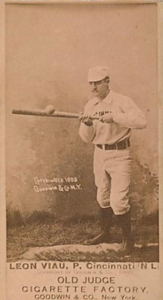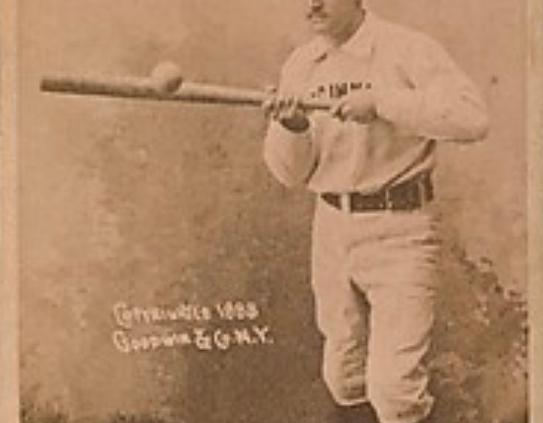Lee Viau
 Corinth, Vermont, is often featured on calendars and postcards portraying the idyllic Vermont village: quiet, rural and little changed from when Leon Viau was born there on July 5, 1866. Leon’s father, Antoin, was a carpenter. The French tinge to his name invites speculation that he came down from Canada. Corinth town records list no Viaus, so it’s likely Leon’s parents didn’t live there long. Then as now, construction projects came and went, and carpenters like Antoin followed the work.
Corinth, Vermont, is often featured on calendars and postcards portraying the idyllic Vermont village: quiet, rural and little changed from when Leon Viau was born there on July 5, 1866. Leon’s father, Antoin, was a carpenter. The French tinge to his name invites speculation that he came down from Canada. Corinth town records list no Viaus, so it’s likely Leon’s parents didn’t live there long. Then as now, construction projects came and went, and carpenters like Antoin followed the work.
Not long after Leon’s birth, the Viaus moved to Hanover, New Hampshire, where Antoin found employment as Dartmouth College’s only janitor. In modern terminology, he was a one-man building-and-grounds crew, not a bad achievement for an itinerant French-Canadian carpenter. At Hanover young Leon, by then nicknamed “Lee,” grew up and gained entrance to Dartmouth in the fall of 1884, enrolling in the Chandler Scientific Department. With college a rare opportunity in those days, especially for someone of Lee’s apparently humble origins, one wonders if his father’s connection with the college helped him gain admittance to the exalted Ivy League.
The young Viau’s athletic prowess also may have had something to do with it, as this was the era of the rise of intercollegiate athletics. Soon after entering college, Lee played left field and batted lead-off for the freshmen in the annual contests held each fall between the four college classes. He batted only .143 in the three intramural games, but his five runs scored led the freshmen in that category. In the spring Dartmouth played rival colleges for the first time. Lee appeared in two games, playing left field and batting seventh in the order. He had three hits (including a double) in nine trips to the plate, and The Dartmouth, in a rare instance of singling out an individual player, commented, “Viau handled the stick with great effect.”
The following spring Viau started the season in left field again, but beginning with the second game he also did some pitching. His mound debut on April 12, 1886, was a disaster. Brown University scored five runs in the first inning (on two hits and numerous errors), after which Viau retreated to the relative safety of left field. Brown went on to a 7-4 win, with Viau accounting for four of Dartmouth’s miscues. It wasn’t a promising beginning for a man destined to pitch in the major leagues, but two days later he started again, this time against MIT. Lee went the distance in a 5-2 win, walking only two and — perhaps the first indication of his promise as a hurler — striking out 16.
Viau pitched in only two more games, finishing with a 2-2 record. For Dartmouth’s 1886 season he played in nine games and batted .167 (6 for 36). A word of caution: It is not known whether the keeper of box scores deducted walks and sacrifices from at-bat totals; in every one of those nine games, Viau is credited with precisely four at bats, so his batting average was possibly a bit higher. In any event, neither his batting nor his pitching statistics provides any objective basis for professional scouts to take notice.
For whatever reason, Lee Viau did attract the attention of a major leaguer named Jim Keenan, who caught for the American Association’s Cincinnati Reds. Keenan recommended him to Gus Schmelz, the Reds’ newly-appointed manager, and in the fall of 1886 Viau signed with a minor league club in St. Paul, Minnesota, for a salary of $275 per month. The Dartmouth faculty lamented the loss of this “most likeable young man.” The alumni magazine later recalled that “Professor Emerson bemoan[ed] the fact that Leon would have to play ball on Sundays.”
After pitching well at St. Paul in 1887 (one newspaper regarded him as “the best pitcher in the league”), Viau signed a $2,500 contract with Cincinnati. The Reds gave him an early chance to prove himself, handing him the ball in their first exhibition game at New Orleans in the spring of 1888. The 21-year-old responded with a 6-0 shutout, then proved it was no fluke by opening the regular season with eight straight wins before suffering his first setback on June 1. For the season, Viau went 27-14 (fifth in the Association in wins and fourth in winning percentage), and compiled an ERA of 2.65 (tenth), 387.2 innings pitched (eighth), 42 complete games (seventh) and 164 strikeouts (tenth). On a pitching staff that included Tony Mullane and Elmer Smith, both 30-game winners in 1887, Viau emerged as the ace as the veterans slumped to 26 and 22 wins respectively.
Though he showed occasional flickers of brilliance, Lee Viau never fulfilled the bright promise of that first season. In 1889 he won 22 games but his ERA slipped to 3.79 while his strikeouts declined and his walks increased. He lost 20 games (eighth-most in the Association) and yielded the title of ace of the staff to rookie Cyclone Jim Duryea, who went 32-19.
The year 1890 was a turbulent one in baseball, with several clubs (including Viau’s Reds) deserting the American Association to join the rival National League, and John Montgomery Ward leading an exodus of many of baseball’s best players to form the Players League. As recalled in his obituary 57 years later, Lee Viau contended that “his work suffered because of continuous pressure brought on him by agents of the Players League, who offered him a big boost in salary if he would jump.” He pitched in only 13 games that season before the Reds traded him to the lackluster Cleveland Spiders.
Viau faired poorly in Cleveland, winning four and losing nine, but his teammates were almost as bad (44-88, 43.5 games back of first). His ERA rose to 3.88, and for the first time he walked more batters than he fanned. At that, Viau’s four wins ranked third on the Spiders, topped only by Ed Beatin‘s 22 victories and the nine wins of a 23-year-old rookie named Denton True Young. Better known as “Cy,” Young won an additional 502 games over the next 21 seasons.
In a spring training exhibition game in Gainesville, Florida, on March 26, 1891, Lee Viau played an unwitting role in launching the career of John McGraw. Charles C. Alexander describes the day’s events in his biography of the Hall-of-Famer:
John McGraw, hitherto an obscure minor leaguer, gained a measure of recognition that day. Years later he admitted that Lee Viau, Cleveland’s pitcher, was still working his arm into condition and didn’t really bear down on the Gainesville batters. Nevertheless, McGraw’s performance against the major leaguers — three doubles in five times at bat, three runs (of six Gainesville scored to Cleveland’s nine), errorless play at shortstop — made his name widely known when the telegraphed reports of the game appeared in the Cleveland newspapers, were picked up by other dailies, and were also noted in the baseball weeklies Sporting Life and Sporting News. Within a week or so, McGraw had heard from a score of professional clubs seeking his services for the coming season.
Viau nearly revived his career in 1891, improving his ERA to 3.01 and winning 18 games as Cleveland, with the acquisition of several stars from the now-defunct Players League, climbed to fifth place (65-74). But the 1892 season had scarcely begun when Cleveland dispatched Viau to Louisville, another second-division club. He started 16 games for the Colonels, posting a dreary 4-11 record before being traded again, this time to Boston. Returning to his native New England, Viau finished his major league career with one last blaze of glory, giving up no earned runs in a complete-game win in his only appearance for the Beaneaters.
Thereafter, the janitor’s son from the quaint Vermont village led an inconspicuous life. Viau drifted to the minors, for a while pitching in the New England League. While records are spotty, he is mentioned as pitching for Fall River and Haverhill in 1894, with a winning percentage of .630 but more wild than ever: 108 walks, versus only 51 strikeouts. Perhaps to blame for his steady decline was his penchant for alcohol; Viau’s name appears on a list of notorious drinkers in a book called Baseball Babylon.
In 1896 Viau pitched in the Atlantic League for Paterson where he had a couple more brushes with future Hall of Famers at the start of their careers: his rookie manager was Ed Barrow, the man most responsible for the success of the New York Yankees between 1921 and 1945; and one of his teammates was 22-year-old Honus Wagner, the greatest shortstop of all time. In their biography of Wagner, Dennis and Jeane DeValeria describe an incident that gives a pretty good indication why Viau was no longer in the majors:
[Barrow] quashed open gambling in the stands, but on two different occasions he had to fine and suspend pitchers for taking the mound while drunk. In another episode, former big league pitcher Lee Viau arrived at the park in an altered state. Several players were upset with him for sampling the spirits when they needed him to pitch, and Wagner expressed their displeasure. Viau, only five feet four inches tall but a stocky power pitcher, grabbed a water bucket and emptied it over Wagner’s head. An unamused Wagner wrapped his large hands around the pitcher’s throat, lifting him off the floor. After a few seconds, Wagner regained his composure and dropped the shaken man. It was a seldom-seen side of the mild-mannered Wagner.
Despite that altercation, Viau hung on with Paterson a couple more seasons, winding up his career in organized baseball there in 1898.
After bouncing around semi-pro baseball and later umpiring a little, Viau worked as manager of the game room at the Paterson Elks Club. There is no record of his ever marrying. Eventually he retired and lived on Social Security. Lee Viau died at age 81 in Hopewell, New Jersey, on December 17, 1947.
Sic transit gloria in the exciting but exacting world of major league baseball. To have known brief moments in the sun was the lot of many of the Green Mountain Boys of Summer, as it was for Lee Viau, the son of an itinerant French-Canadian carpenter who rose from the obscure village of Corinth to stardom as teammate of Biddy McPhee and Cy Young. Viau retired from major league baseball with a winning record (83-77), chiefly as a result of his glorious rookie season with the 1888 Cincinnatti Reds.
Sources
A version of this biography originally appeared in Green Mountain Boys of Summer: Vermonters in the Major Leagues 1882-1993, edited by Tom Simon (New England Press, 2000).
In researching this article, the author made use of the subject’s file at the National Baseball Hall of Fame Library, the Tom Shea Collection, the archives at the University of Vermont, and several local newspapers.
Full Name
Leon A. Viau
Born
July 5, 1866 at Corinth, VT (USA)
Died
December 17, 1947 at Hopewell, NJ (USA)
If you can help us improve this player’s biography, contact us.


